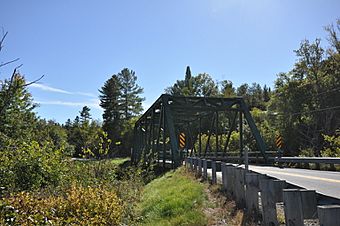Bloomfield-Nulhegan River Route 102 Bridge facts for kids
Quick facts for kids |
|
|
Bloomfield-Nulhegan River Route 102 Bridge
|
|
 |
|
| Location | VT 102 over the Nulhegan R., Bloomfield, Vermont |
|---|---|
| Area | less than one acre |
| Built | 1937 |
| Architectural style | Pratt through truss |
| MPS | Metal Truss, Masonry, and Concrete Bridges in Vermont MPS |
| NRHP reference No. | 91001605 |
| Added to NRHP | November 14, 1991 |
The Bloomfield-Nulhegan River Route 102 Bridge is a special historic bridge in Bloomfield, Vermont. It helps Vermont Route 102 cross over the Nulhegan River. This river then flows into the larger Connecticut River, just south of Bloomfield Village. Built in 1937, this bridge is a great example of a "Pratt through truss" design. This type of bridge was very advanced for its time. Because of its importance, it was added to the National Register of Historic Places in 1991.
Contents
What Makes This Bridge Special?
The Bloomfield-Nulhegan River Bridge is a "Pratt through truss" bridge. This means the main support structure, called a truss, goes through the bridge. Cars drive between the truss parts. The bridge is made of strong steel and sits on concrete supports.
Bridge Dimensions and Features
This bridge is about 134 feet (41 meters) long. It is 24 feet (7.3 meters) wide. This allows two lanes of traffic to cross safely. The bridge stands about 10 feet (3 meters) above the river. The top of the bridge opening is 15 feet (4.6 meters) high.
How the Bridge Was Built
The bridge's trusses are made from large steel I-beams. These beams were put together right at the building site. Workers used a method called "hydraulic riveting." This was a new technology in the 1920s. It made the connections very strong. The road surface is pavement laid over concrete. This concrete sits on more I-beams, which are attached to the main truss.
Why Was This Bridge Built?
The Bloomfield-Nulhegan River Bridge was built in 1937. It was part of a big bridge-building project in Vermont. This project started after a huge flood hit the state in 1927. Many bridges were destroyed in that flood. So, the state decided to build new, stronger bridges.
This bridge is a good example of the new building standards. It also shows the advanced technology used back then. Being able to put the bridge together on site was a big step forward. It meant the heavy truss parts did not need to be shipped from a factory.



